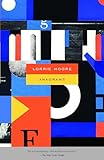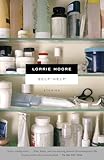
 We all came out of Lorrie Moore’s overcoat–or her frog hospital, her bonehead Halloween costume. If you’re a young woman writer with a comic tendency, and you like similes and wordplay, and you traffic in the human wilderness of misunderstanding and alienation, then you most certainly participate in the Moore tradition. I recognize her influence in the work of my peers, and in my own. She is one of my favorite writers, and I can still remember how I felt reading her first collection, Self-Help: delighted, stunned, moved, humbled, and most of all, grateful. By now I’ve read all of her books; I kept Anagrams at a distance for as long as I could, until I really needed a literary jump start. And, waiting for me were terrific passages like this one:
We all came out of Lorrie Moore’s overcoat–or her frog hospital, her bonehead Halloween costume. If you’re a young woman writer with a comic tendency, and you like similes and wordplay, and you traffic in the human wilderness of misunderstanding and alienation, then you most certainly participate in the Moore tradition. I recognize her influence in the work of my peers, and in my own. She is one of my favorite writers, and I can still remember how I felt reading her first collection, Self-Help: delighted, stunned, moved, humbled, and most of all, grateful. By now I’ve read all of her books; I kept Anagrams at a distance for as long as I could, until I really needed a literary jump start. And, waiting for me were terrific passages like this one:
The problem with a beautiful woman is that she makes everyone around her feel hopelessly masculine, which if you’re already male to begin with poses no particular problem. But if you’re anyone else, your whole sexual identity gets dragged into the principal’s office: “So what’s this I hear about you prancing around, masquerading as a woman?” You are answerless. You are sitting on your hands. You are praying for your breasts to grow, your hair to perk up.
Wowza, right?
 You can imagine how excited I was to read her new novel, A Gate at the Stairs, which has just been released. I remember taking it to the tub (where I do all my best reading), and emerging wide-eyed. “Oh that Lorrie!” I might have exclaimed to my husband. It started out so well. And then…And then. Oh, reader, I was disappointed by this novel! Deeply disappointed. Once my father failed to call me on my birthday. It felt sort of like that.
You can imagine how excited I was to read her new novel, A Gate at the Stairs, which has just been released. I remember taking it to the tub (where I do all my best reading), and emerging wide-eyed. “Oh that Lorrie!” I might have exclaimed to my husband. It started out so well. And then…And then. Oh, reader, I was disappointed by this novel! Deeply disappointed. Once my father failed to call me on my birthday. It felt sort of like that.
I decided I wasn’t going to write about A Gate at the Stairs because I love Lorrie Moore too much to criticize her first book in ten years. And, besides, I figured other reviewers would succinctly articulate my disappointment for me. But then, last week, Michiko Kakutani’s review came out:
Ms. Moore has written her most powerful book yet, a book that gives us an indelible portrait of a young woman coming of age in the Midwest in the year after 9/11 and her initiation into the adult world of loss and grief.
Jonathan Lethem, also for the New York Times, liked it as well:
Great writers usually present us with mysteries, but the mystery Lorrie Moore presents consists of appearing genial, joshing and earnest at once — unmysterious, in other words, yet still great. She’s a discomfiting, sometimes even rageful writer, lurking in the disguise of an endearing one. On finishing A Gate at the Stairs I turned to the reader nearest to me and made her swear to read it immediately…
Upon reading these reviews, I was dumbfounded, and also, oddly, relieved (I feel protective of Ms. Moore–so what if she’s not my real-life pal?) But now that a praise-fest has begun, I must voice a dissenting opinion. Whereas Kakutani is willing to overlook what she calls the book’s “narrative stumbles,” I cannot.
Like the novel’s narrator Tassie Keltjin, I was twenty years old in 2001, and like Tassie, I attended college in the midwest, and I was at that college on September 11th–and after. Certain passages at the opening of the book captured perfectly my own experience, for although I wasn’t raised on a small potato farm, I too felt as if “someone had led me out of the cave” and into a “life of books and films and witty friends.” That is not to say that I only liked the book when it reflected my own life. Here Moore writes deftly Tassie’s experience:
My brain was on fire with Chaucer, Sylvia Plath, Simone de Beauvoir. Twice a week a young professor named Thad, dressed in jeans and a tie, stood before a lecture hall of stunned farm kids like me and spoke thrillingly of Henry James’s masturbation of the comma. I was riveted. I had never before seen a man wear jeans with a tie.
The above passage differs from my own experience in important ways, and it’s still believable and comic. I was not “a stunned farm kid,” and although I knew nothing of Henry James, I knew something about the sartorial possibilities for men. (I am from Los Angeles, after all. ) Without the jeans-and-ties line, this description wouldn’t be as funny, just as the farm kid line juxtaposes wonderfully with Henry James line. Overall, and most importantly, I believe in Tassie’s reaction to Thad, just as I believe in the uncertainty and discomfort she feels around Sarah Brink, the woman who hires Tassie to babysit her adopted daughter (before she’s even been adopted). This material in the novel was successful and meaningful to me.
Throughout, Tassie’s ruminations on the differences between young and middle-aged women rocked me in the way that only a character’s specific vision can: “These middle-aged women seemed very tired to me, as if hope had been wrung out of them and replaced with a deathly sort of sleep.” And, right on the third page: “Then we fell into a kind of hysteria–frightened, guilty, hopeless laughter I have never actually witnessed in a woman over thirty.” Likewise, certain material about people’s complicated relationship with race also struck me as right-on, and surprising: “When I was a freshman there was a girl in my dorm named Rachel. Because her dad was black and her mom was white, her friends called her Inter-Rachel. She would always laugh.” In these moments, Tassie felt complex and real, and for a novel that asks me to have an emotional reaction to its narrator’s isolation, to the secrets kept from her, to the injustices of a country, of a town, of one family–I need to believe the narrator and regard her as multidimensional.
Unfortunately, as the novel continued, Tassie’s perspective felt less and less true to me. This is a retrospective account of Tassie at twenty, which means she is under thirty when she tells the story, perhaps still capable of that laughter referred to at the opening. And, yet, this narrator did not feel like a twenty-eight year old woman. It’s difficult to figure out why exactly. It wasn’t so much that her cultural references were before-her-time (they were, although one could classify this as one of Tassie’s distinctive characteristics), but that Moore failed to fully inhabit her first-person narrator. This wasn’t Tassie’s vision of the world, but the author’s–or some version of Lorrie Moore that I’ve known and loved in previous books. Either I’ve fallen out of love, or this book and its deeply complicated and ambitious subject matter requires more, or something different, than what my favorite author has previously offered.
In A Gate at the Stairs, Lorrie Moore’s beloved and well-known authorial perspective comes at a cost: the narrator is subsumed by it, and, unfortunately, so is the plot. As Tassie became less of a character, more of a simile- and observation-generator, I felt less connected to the events occurring. But, at the same time, I was also frustrated when the story stalled to describe things, like the speech patterns of Midwesterners; no matter how funny or sharply observed, these passages felt off the spine of the story. I had the distinct sense while reading this novel, that it would have made a wonderful short story. A Gate at the Stairs feels stretched out, thinned, with uneven pacing, slow sections and redundant scenes. I hate to say this, but I was often bored by A Gate at the Stairs. My mother always said, “If you’re bored, read a book.” But what do you do when the book you’re reading bores you? And what do you do when the book that’s boring you is by your favorite author, and you’ve been waiting for it for so long? Even now, I don’t know if my problems with the novel stem from the novel itself, or are my own. It may be that I’m simply being too hard on it, or that my needs as a reader have changed. Do we need to go to couple’s therapy, Lorrie?
In Lethem’s review, he considers giving A Gate at the Stairs to a friend of his who finds Moore “too punny.” I don’t think that’s such a good idea, for in this new novel, Moore’s gifts become the book’s greatest burdens. If you’re a fan of Lorrie Moore, you must read this novel (and I sincerely hope you like it), but if you aren’t, or if you haven’t read her before, I suggest exploring the rest of her dazzling oeuvre first–you won’t be disappointed.









